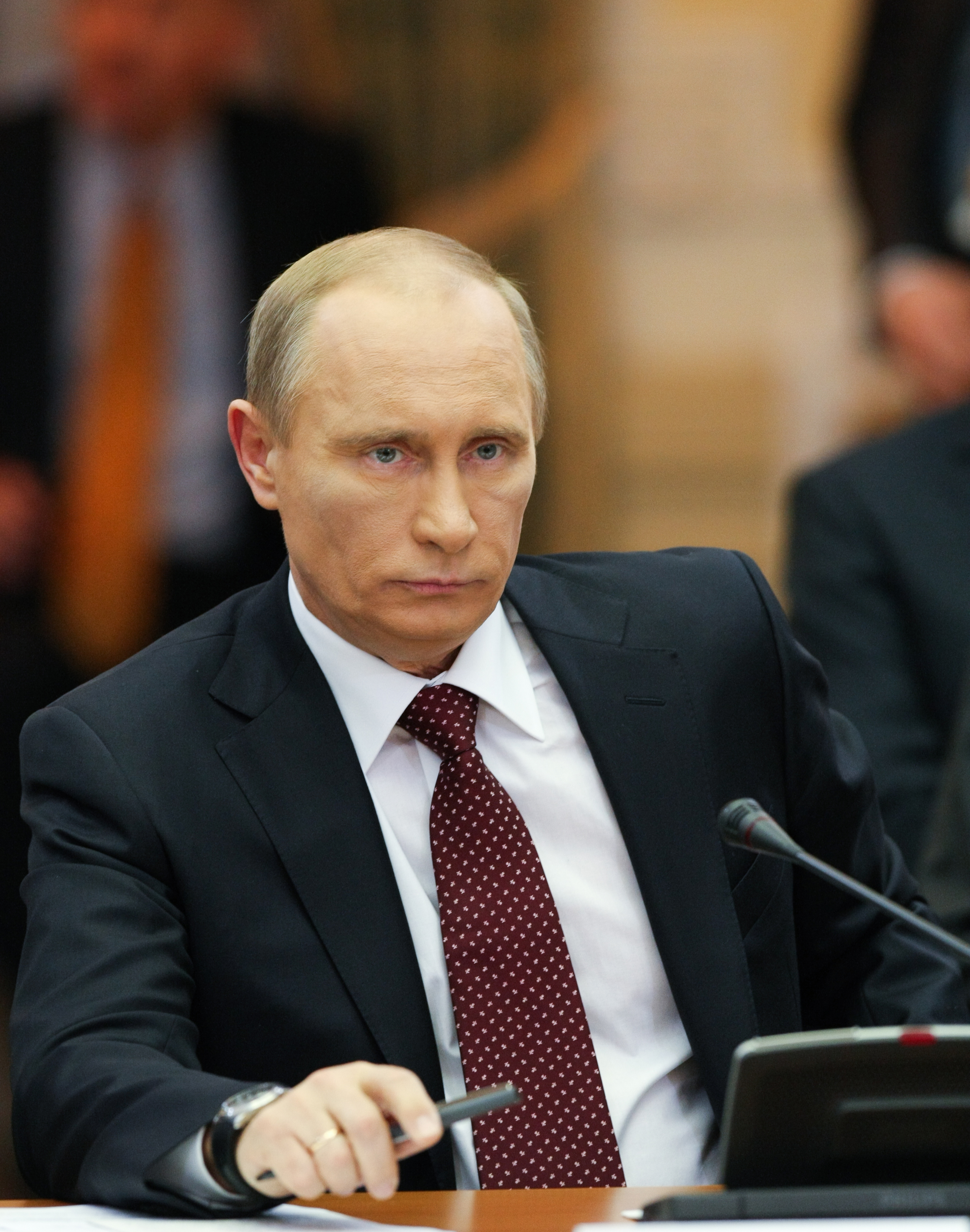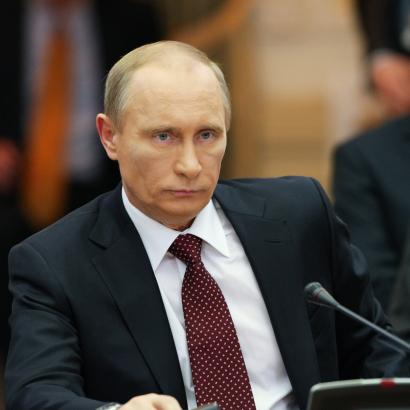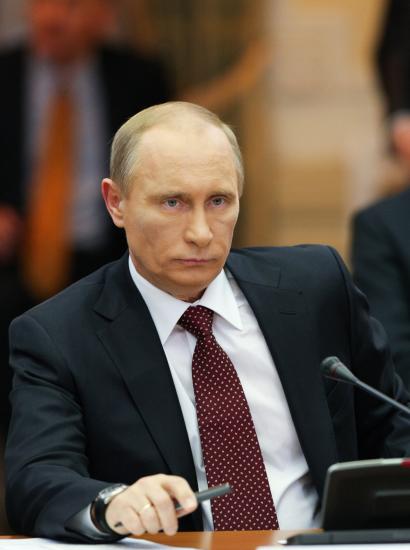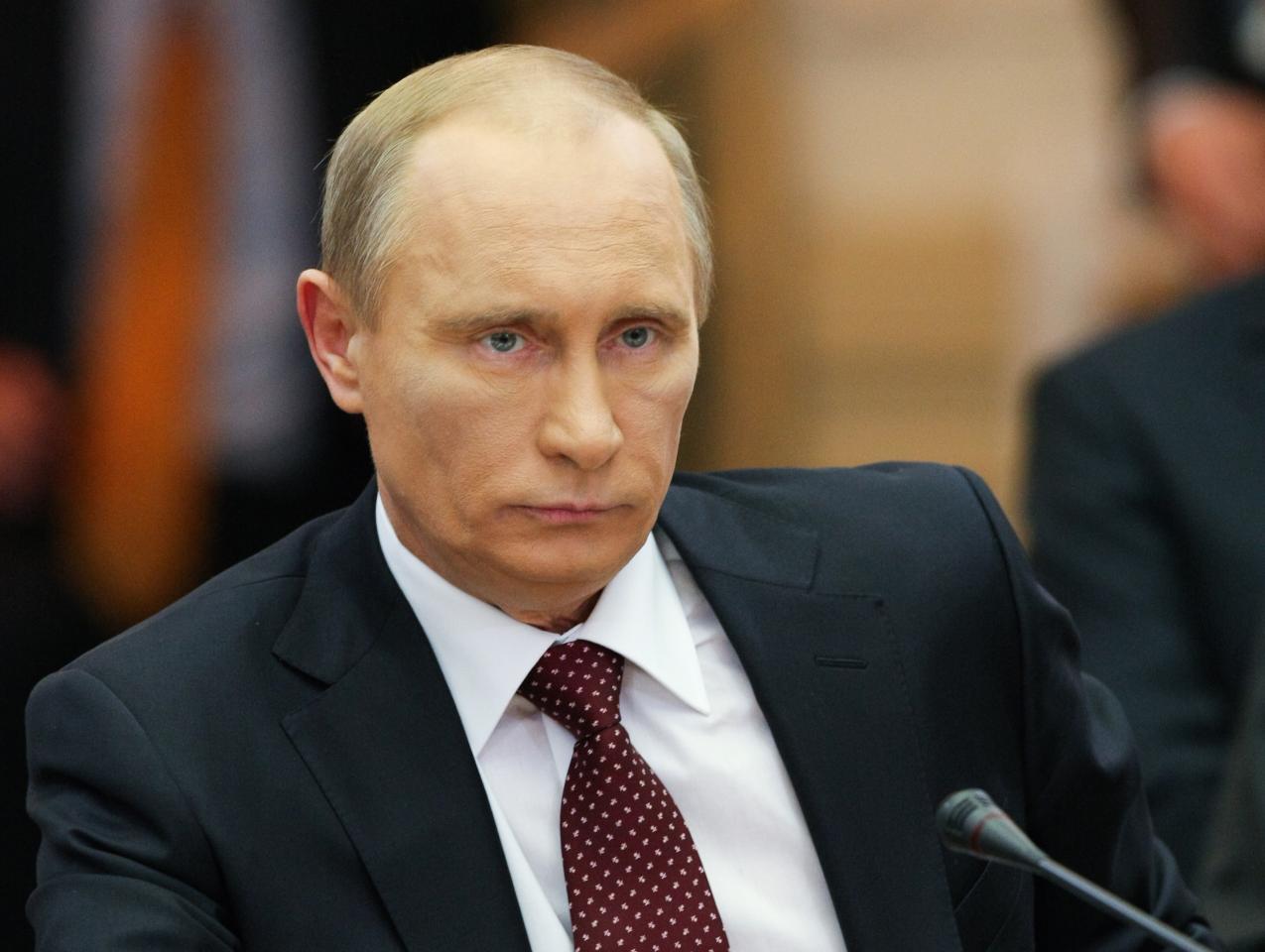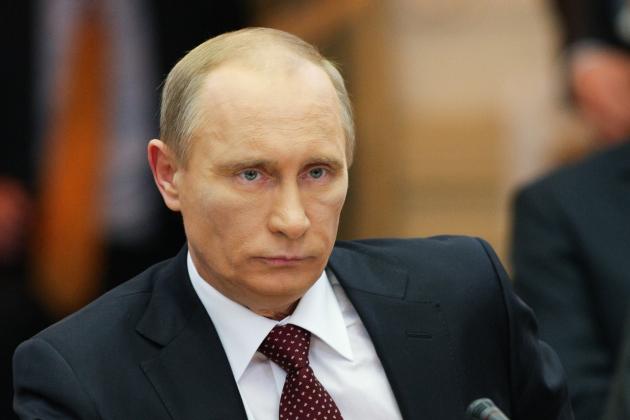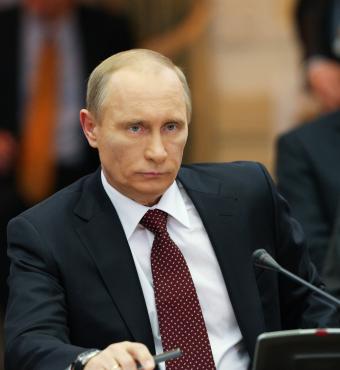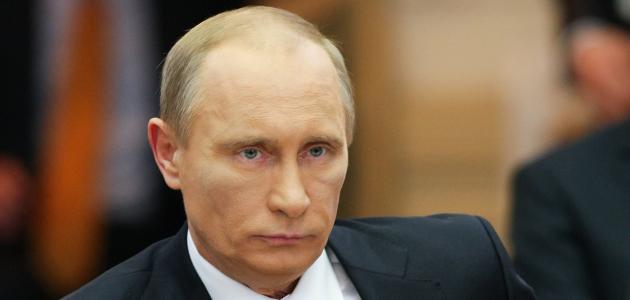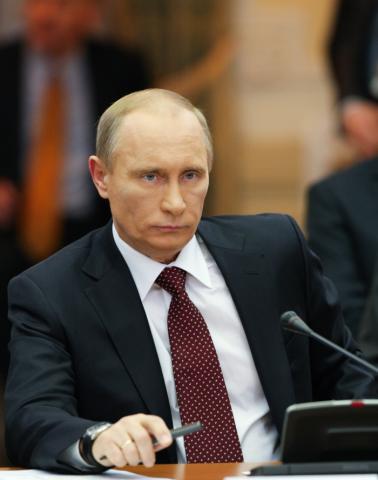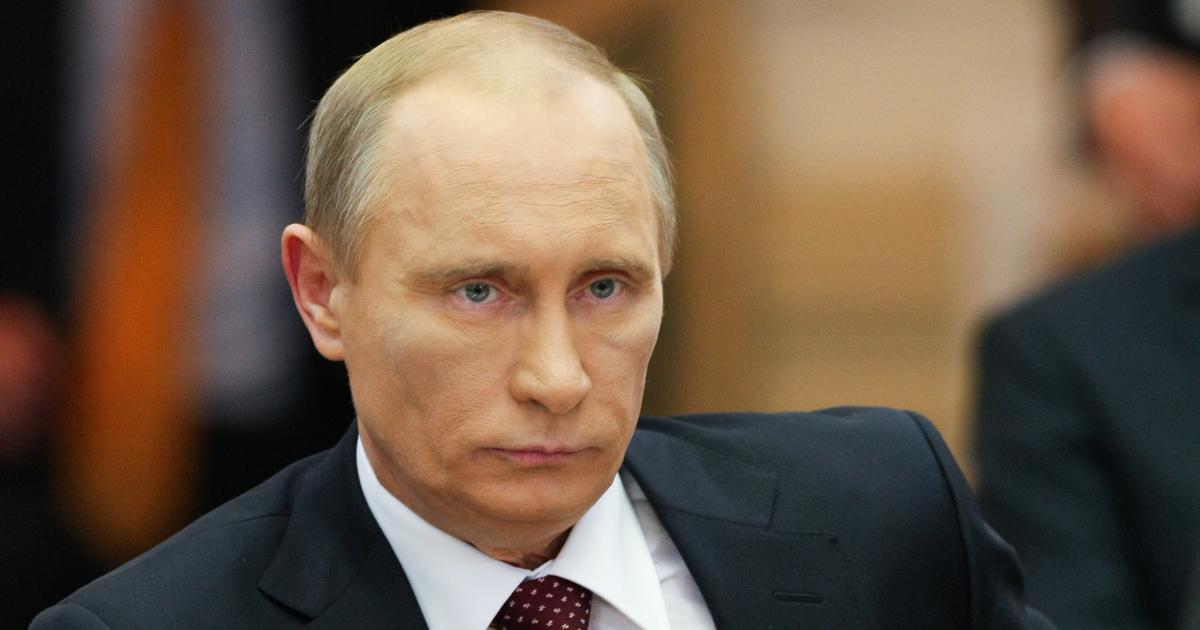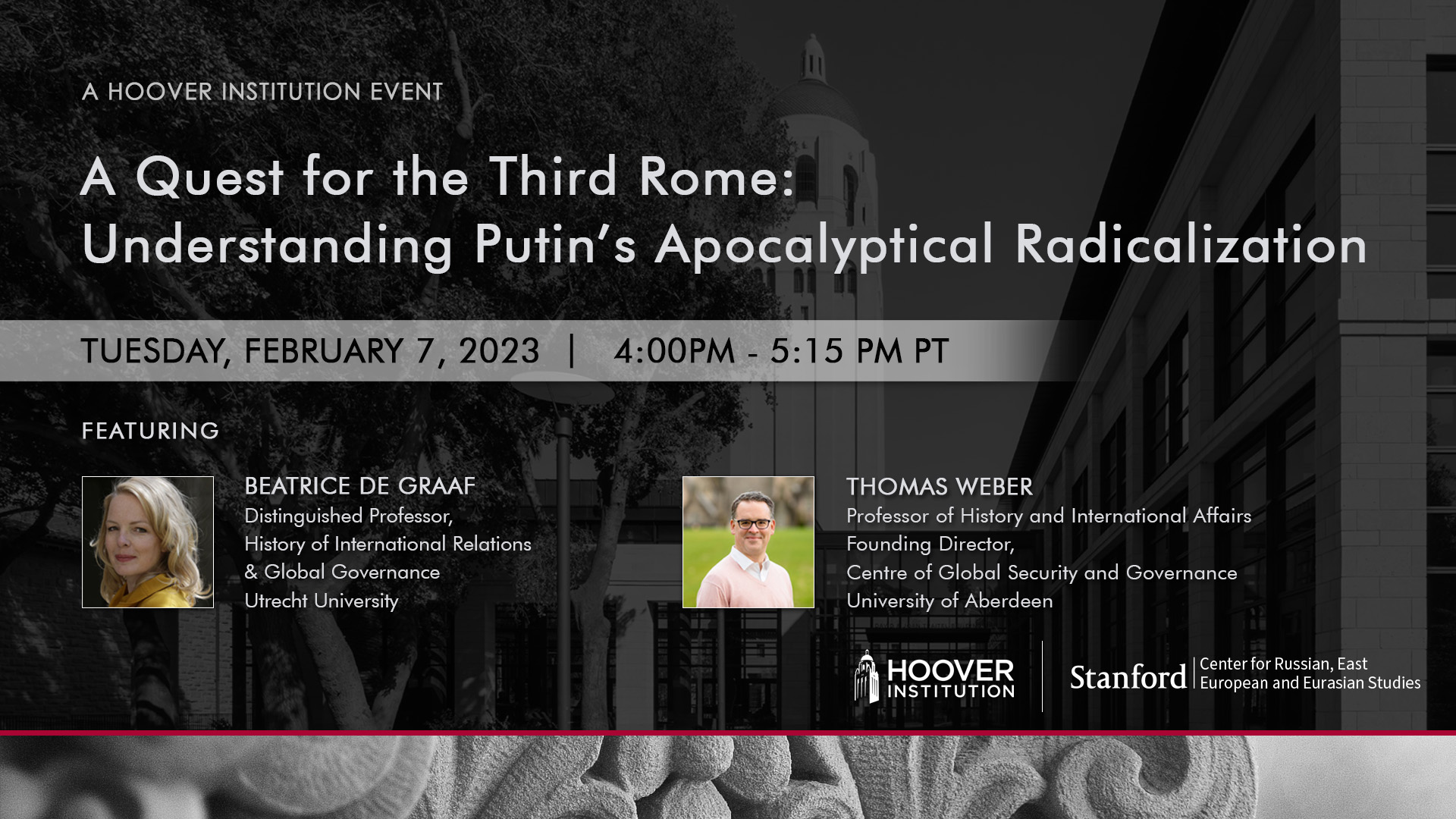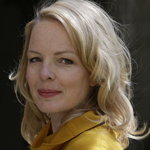
The Hoover Institution and Stanford's Center for Russian, East European, and Eurasian Studies hosted A Quest for the Third Rome: Understanding Putin’s Apocalyptical Radicalization on Tuesday, February 7, 2023 at 4:00 pm PT.
In this talk, Beatrice de Graaf lays out how, since coming to power in 2000, Vladimir Putin has relied increasingly on a toxic combination of Tsarist history and Russian Orthodoxy to two ends: for inspiration and to mobilize his followers. In the process, Putin created an apocalyptical, metaphysical scheme that has served to fuel his own radicalization and helped pave the way to the invasion of Ukraine. The talk is based on research de Graaf and Niels Drost carried out on a collection of over 11,000 speeches, statements, declarations, and interviews from 1999 to 2022.
>> Tom: Welcome to today's event. As we are trying to anticipate Vladimir Putin's next steps ahead of a possible spring offensive, we are all trying to figure out how will we respond to what lies ahead? What kind of actor is he and will he turn out to be? Is he, as Francois Hollande said a few days ago, a radically rational or rationally radical person?
Is he the irrational person that a lot of people think he is? So welcome to today's event with the title of A Quest for the Third Rome: Understanding Putin's Radicalization with Beatrice De Graaf. Where we will try to be explored both in the talk as well in the discussion afterwards, this kind of question.
Beatrice De Graaf is distinguished professor of the history of international relations and global governance at Utrecht University. She's the former chair of the Dutch or she's a former chair of the Dutch National Research Agenda. She held a visiting fellowship at St Catherine's College, Cambridge. She's extraordinarily versatile and impressive scholar, working at the intersection of history, security and policy.
She initiated, amongst other things, an Utrecht-based international security history network. She also started an applied history initiative in the Netherlands, and she is a much sought-after expert for government agencies and other organizations, particularly on terrorism, radicalization and crisis prevention and response. Those of you who attended yesterday's session of the Hoover History working group know that she's the author of, amongst other books, Fighting Terror After Napoleon: How Europe Became Secure After 1815, published by Cambridge University Press.
A book on the post-1815 blueprint for collective European security. Those who missed yesterday's talk and would like to find out why this is such a good book should come to Brussels next month when she will receive the Duke Arenberg Prize for the best book on European history, and I will have the honor of delivering the laudatory remarks.
So you have to come back. She has won many other prizes, which include the 2018 Stevin Prize of the Dutch Research Council, the highest academic prize in the Netherlands. As well as, most recently, a prize on how to rebuild trust in society, a Dutch prize for her Terra info project, which is about how to teach into high school students terrorism, conflict, and war.
She's also the author of a book in Dutch which translates into Radical Redemption: What Do Terrorists Really Believe? Which soon will come out with Oxford University Press. In English, it's about the role of radical redemption, the radicalization of Islamist terrorists, based on her interviews of 35 terrorists in detention in the Netherlands and Indonesia.
And in October, she brought out a little essay, as in book form, Crisis, published in book from the Netherlands as part of the history months, where one historian is invited every year to write the essay. And on what we can learn from crisis responses of the last 200 years for current and future challenges.
It was such a hunger for this topic, and I guess it was so good, that it made it to the, I think, number six of the combined fiction and nonfiction bestseller list right after Stephen King. It helped to initiate a national conversation on crisis responses in the Netherlands.
Finally, what I want to talk, since I only have seven minutes to introduce a scholar for whom we would need much more, she has contributed a fascinating chapter to my own new book on the lessons of the death of Democracy in 1933 for today. Beatrice's chapter looks at the lessons of democratic survival in 1933, as she and I have been trying to tease out the success factors of democratic survival in 1933.
In the belief that identifying states from the past that were resilient against a wide array of challenges might be more useful than narrowly focusing on cases of democratic breakdown. She and I are also now working on a new project, tentatively called Europe In Crisis, on the nexus between crisis perception, radicalization, and breakdown, both in the past and the present.
In an attempt to tease out some of the kind of lessons or defined ideas of how free societies can become more resilient and survive in moments where a new perception of the presence of an existential do-or-die permanent crisis is taking hold. Precisely the kind of moment where, in the past, free societies broke down.
In order to be able to talk about or to tease out the ideas that sustain the survival of free societies. And this also brings me back to today's topic, to Putin's Quest for the Third Rome: Understanding Putin's Radicalization and How to Respond to It. It is based on work carried out together with Niels Jost, her former student, now a junior fellow at the Clingendael Institute, which, as I'm sure you all know, is the preeminent political think tank in the Netherlands.
And he's one of the kind of the leading voices, or emerging voices in the Netherlands and in Europe trying to make sense of the challenge coming from Russia. What both Niels Jost and Beatrice De Graaf bring to the table, as we will see, is, of course, Niels Jost's expertise.
It is a unique dataset, and we'll hear about that more. And, of course, also Beatrice De Graaf's own expertise, particularly on security and radicalization, and particularly also, in her case, on the intersection of religion and radicalization. And there's maybe no more perfect place in the world to present this than the Hoover Institution and the Center for Russian, European and Eurasian studies.
So therefore, I would also thank our two hosts today because it's difficult to think of a better place where you have this kind of expertise, both in Russia as well as in government. And in that sense, I also see this, and I think Beatrice De Graaf would agree with this, not just as a presentation by her, but really as a kind of workshop that involves all of you, cuz we hear what she brings to the table.
But you also bring your Russia's specific expertise, as well as your government expertise to the table. So I very much hope this event today will be a two way process on figuring out collectively how to respond to Vladimir Putin as the future of the free world hangs in the air in Ukraine and elsewhere.
Please join me in welcoming Beatrice De Graaf.
>> Beatrice De Graaf: Thank you so much, Tom, for that wonderful, very generous introduction. I rather not dare to start now, after all those beautiful words, but thank you so much. And also thank you for having me here exactly on this crossroads of government, international relations, history, and Russian politics.
So I'm very happy to share our findings with you. Tom, could you please give me that?
>> Beatrice De Graaf: So Putin and the third Rome. Right after the Russian invasion in Ukraine on February 24, the world was in shock. And in the Netherlands, on television, and I noticed elsewhere as well, pundits went berserk, was Putin gone mad?
Had he fallen ill? Had he gone out of his nugget? What happened? And pundits and politicians over the world started to dabble in the ancient art of criminology again. Look at how Putin clung with his right hand to the table, perhaps he was suffering from cancer. Well, then Putin himself stated, not quite reassuringly, we have not gone mad.
We are aware of what nuclear weapons are. As historians and others have pointed out, there are different types of rationalities. There are instrumental rationalities, you do something to achieve a certain purpose. There are epistemic rationalities, you do something because it feels true. And there's also rational irrationality, something that we find unbelievable, but which follows a kind of a logical ideological argument for the perpetrator.
What may seem absurd and insane may be the product of long-term planning strategy and reasoning along the lines of deeply seated worldviews. Political strategies always are also the outcome of a specific way of appraising social conditions that follow completely logical lines within the framework of that specific perpetrator, if not of ours.
So today, I will try to share with you our findings on how history is being used as one of these appraisals by Putin. History is a producer of social cultural appraisal structures that serve the mental mobilization of Russian society by president Vladimir Putin, and not just since February 22, but already since the inception of Putin's rule.
So has Putin gone mad? No, has he become a religious fanatic? No, but he now has prompted himself up, he says it so himself. The principal historian in Russia, that is Putin, he sees himself, his person, his presidency, in historical dimensions, and he acts in a way that permits him to achieve his historical goals.
So two disclaimers before I proceed. First of all, and Tom already hinted upon this, and for me, important to stress in such an esteemed environment, I'm not a Russianist myself. My student, Niels Drost, did the language coding for me. I'm a scholar of security radicalization and extremism. But I did interview, I started my career in 1998 with interviewing Wehrmacht veterans from a German Hitler army.
I interviewed Stasi officers and studied Stasi influence operations that they did with the KGB together, that was what my PhD was about. I then applied these methods to terrorists and radicalization. And now we tried to apply it to Putin as well. And I did dabble a bit in Russian language myself, too.
The second disclaimer is that, I will share today with you ideas on Putin's radicalization as part of a bigger puzzle. And I'm not sharing the whole puzzle with you, just this part. This paper is partly inspired by my student Niels Drost, but also by Catherine Belton, who wrote a brilliant and illuminating book, you must know it, Putin's people.
And there she writes, from the beginning, they, Putin and KGB men, were searching for a new national identity, ideal material with which to rebuild a nation out of hardship and loss. And the tenets of the Orthodox Church and history provided a powerful unifying creed that stretched back beyond the soviet era to the days of the Russian as imperialist past.
So that set us thinking, and we already had, three years ago, started this research process, so she compounded it. That highlighting the role of history, religion as producers of worldviews is important, and we hope to enrich the field of Russian studies with this and also hope to receive feedback from you.
So history, publication of Vladimir Putin's essay on the historical unity of Russia and Ukraine in the summer of 2021 initially barely raised an eyebrow in the west. Some observers wondered why the president would undertake the effort to pin down his selective views on Russia's common history with Ukraine.
But few fathomed that this would be the prelude to a full scale invasion. But history was already back in international politics, particularly so in Russia with Putin. Already in 2005, Putin had remarked, in any case, we will take our decisions based on our history, on our unique history.
And since the inception of his presidential rule, he has done so. And he finds inspiration mostly in the Tsarist past of Russia, not so much the soviet past, but the Tsarist past, in Russian orthodox Christian past, and in the great events of Russian history. And the way in which Putin instrumentalizes historical inspiration has been written about by a variety of scholars.
But only few take the combination of history, orthodoxy, to be the heart of their research in studying the trajectory of Putin's worldviews. That's why we, in a special issue we published about this and many more very fascinating articles in it just came out, it's open access. So what did we do?
We presented in that first findings based on a corpus of texts, 11,000 and more speeches, statements, declarations and interviews made by Putin from 1999 until 2022. These statements were made by Putin for a wide variety of audiences were put up on the Kremlin website. They're taken down now, but we have them all collected right in time.
They were taken down only a week after the invasion of Ukraine. So what we did,
>> Beatrice De Graaf: This is a computer program that we made. We analyzed the transcript of Putin's speeches, meetings, interviews, articles published on the website. We used escape rescraping code in the R programming language. And we used the code, the software, and it thus identifies the titles of the transcript, and it looks like this.
And in simple words, the software goes to the Kremlin website, extract the titles and links of 20 speeches a time. We couldn't do it straight away because that would perhaps draw an attention by the Kremlin still, this was for the war. But we didn't want to rouse them, of course.
And the code then goes into each individual transcript, gathering the name, publication date and text, creates a text file on the computer. And to prevent the permanent site from blocking us, the software waits a random number of seconds before it continues. So in that fashion, took us some time, but we repeated itself until every 20,000 text files, of which 11,000 plus were unique, were collected.
And what did we do with these text files? Next, we created a list of relevant keywords. And what stood out already and had been mentioned by other peoples is that Putin Extremely and increasingly spoke about history, policy, religion, tsar so that what we did is we coded every substantial noun, such as coronation, bible, tsar, the names of the tsars, noteworthy events.
And combined that with all kinds of different declinations, combining our data set of the words with the speeches, and we started our analysis. So this is the AntConc corpus analysis toolkit by Lawrence Anthony, for those of you who are interested. And in this example, we can see everything Putin, for example, has said about Catherine the Great, and we took the cases in Russian grammar into account.
Sorry, so we not just searched for Katerina, but also for Yekaterini, Yekaterina, so all the various declinations. So, having done all that, what struck us straight away is the increasing frequency of Christian, eschatological, historical statements on the one hand, with tsarist references on the other. Moreover, what also stood out is the radicalizing way in which Putin deployed these terms since 2000 around key moments that, and this is very fascinating, that we're not only of foreign making.
So it's not foreign events, expansion of the NATO, decisions, speeches by Bush or others, that prompted Putin to use these words. If you follow the corpus, the trajectory, you can see that it's prompted by domestic key events as well. So it's important in line with what scholars like Graham Ellison have described as path dependency in decision making, that we contextualize the decisions the Kremlin made, that Putin made, in a chronological way.
And our argument is that Putin's statements should be read as a trajectory, chronologically, narratively speaking, of radicalization. And I'll demonstrate it in a minute. So radicalization is understood here in the terminology that's being used in my field as a process towards increasing acceptance of violence, which explains extremist behavior and exclusions of other groups.
The problem with radicalization, normally, is that you have words and you have deeds. And how on earth can you make predictable statements about when someone uses a radical term, that he actually will be throwing bombs as well? Now, with Putin, now we know. In fact, we made this analysis on Putin's speeches.
As I said, we started three years ago, and the first analysis was finished and delivered a month before the invasion of Ukraine. And we looked at the data and we could just not believe what was happening. It was a radicalization process, but we just could not see the next step that was coming only in four weeks.
So when Niels defended his master thesis, the invasion had already started. And then, of course, the whole trajectory of the speeches made sense. But we were blinded, in a sense, that we saw the words, we just couldn't get our heads around the fact that this meant war. So we could have predicted it, we didn't.
I have to be very honest in that. Still, radicalization, it entails reappraisal of other groups from a position of moral superiority, the attribution of outgroup as morally inferior, but needs to be eliminated based on a reappraisal fueled by emotions of contempt. This is all in the vast body of literature on radicalization, which we just applied to Putin's speeches.
And why do people do that? Why didn't bin Laden do this? Why you could equally project it on Hitler's speeches, for example, which Thomas Weber is working. Well, you need a kind of a legitimization, even if you're a dictator, not just for projecting power, but also by enforcing power and taking society with you.
So in our research, we found, and that I will start to explain now, how Putin, between 1999 and 2022, increasingly channeled elements from Russian imperial history and Christian tradition to formulate a new state ideology. Mobilize the Russians behind his mission of holy Russian empire, demonize his enemies, and embrace apocalyptical thinking.
So the invasion in Ukraine is only the last stage. How does this all start and what will come next? Well, starting with the first stage, which is more or less a chronological, a linear trajectory propping up a new post Soviet empire. Well, from the moment of his inauguration as a president in 2000, Putin has stressed the importance of Christianity for him personally.
He oftentimes mentioned how his great grandparents went to church, how Christianity was a unifying force in Russian history. As he said, as a matter of fact, Russia has always been a very pious country, very religious country. He also made it clear that he himself reads the Bible regularly.
Bear in mind, I'm not saying that Putin believes all of this is a religious salad. But it is important to take world views of state leaders seriously in the sense that they find it seriously enough to share it, to use it, to instrumentalize it, and to weaponize it.
So what it actually means, we can have a discussion over this. But the interesting fact is that very consistently and persistently, over time, Putin has used these statements. So, for example, already in the 2000s, he said, I have a copy of the Bible in my plane, I fly a lot.
Always if I fly, I have an icon and a Bible embroidered, and everything is there. More importantly, Orthodoxy was, in his view, one of the political and moral foundations of the Russian empire. The church has always played a huge role in Russia, he said. It's a state institution.
It acted as a moral school, and even the administrative factor of the church was essential. There's no institution in the modern world other than the church, and only the orthodox church that can fill this spiritual vacuum. That's the next fascinating step. Putin made statements again, from the inception of his presidency.
In 2000, he presented the Russian orthodox brand of Christianity as a substitute for the communist state ideology that, in his eyes, had gone bankrupt. Quote of Putin, after the October Revolution, the state went to great lengths to destroy our spiritual and religious roots and was unwavering and cruel in pursuing this objective.
The primary historian of Russia now denouncing the atheism of Soviet Union. Many churches were raised to the ground. Back then, the state attempted to come up with quasi religion and replace the Bible with the moral code of the Bill of Communism. Well, Putin said, his quote, it did not work.
This is also the speech to quote that he used when he visited President Bush in Camp David. And you may remember this special moment where Bush said, I looked him in the eyes and I could see his soul. I'm not sure if that was really true, but you can see while Putin, a master of deception, he was a KGB officer, a master of deception, uses this language to take in the West as well.
But it's not just to take in the West, it's also to create something for himself. In 2007, not with President Bush, but with the participants of the Valdai Discussion Club, important platform for Putin, Putin was asked what Russia's new mission was. Which idea Russia should propagate outside its borders.
And again, he reminded his audience of businessmen, tycoons, etc, politicians, that the basic principles of the Russian empire are the ideals of monarchy, the link with the people and orthodoxy. That's what Putin said in 2007. And you're Russianists, though these are obviously cornerstones of the Russian empire. Echoing the triad of nationality, orthodoxy, autocracy, nationality as echoed by Czar Nicholas I in 1833 as a response to the Decembrist revolt and an attempt to mobilize society around the Czar.
So, interestingly, what we found from the speeches as well is that already very early on, between 2000 and 2008, Putin mentioned Alexander I a lot. In Putin's word, Alexander I entered history as Napoleon's conqueror, a forward looking strategist and a diplomat, a statesman who shouldered responsibility for the security development of Europe and the whole world, Putin said.
So for Putin, Alexander I was a European Czar, a Czar who went into Paris underneath the Arc de Triomphe, who was cherished and respected in Europe like he wanted to be respected. At the same time, already back then, there's this other strand of Czarist fascination by Putin, that is Nicholas I.
It's the successor, the brother of Czar Alexander, who was obviously a different Czar, a far more repressive Czar, who came up with his stride of nationality. So, interestingly, he came up with this, and not after the war in Georgia 2008, or the enlargement of the NATO. But after the attacks in Russia itself, in Moscow in 2002, in Beslan in 2004, in other situations, he felt that he had to assert a kind of power of strength for his society.
The honoring of the Czars Alexander I, Nicholas I, the creation of new monuments was coupled with large scale donations to the Russian Orthodox Church, the financing of new churches. And Putin hence succeeded in formulating and disseminating this new central state ideology, connecting the space of Russian historical experiences with future greatness.
We could say, so far, so good. Second stage,
>> Beatrice De Graaf: The next step in this trajectory of radicalization, the second step was how Putin put the imperial and Christian Russian past to use, was in mobilizing the society around his new mission. He had formulated it, now he had to mobilize society, and he harked back to the days of the glorious past.
As he stated, today, we do not have a monopoly on ideology, we have thrown out the child with the water, we have stopped to pay attention to patriotism, simply, no one does anything about it. In the Russian empire, at least, it was the domain of the church. So in 2012, 13, he explicitly condoned and advocated the role of imperial orthodox thinking in expanding the empire.
It became increasingly clear what Putin meant, referring to this unique Russian role in history. Russian Orthodoxy, according to Putin, had lent its support to the Russian state, to do what, to expand. Sincere, resolute faith, according to Putin, helped our ancestors overcome the most difficult trials together. The experience of moral improvement, cultural development has been an integral part of the heritage of Eastern Christianity, uniting entire peoples, expanding, belonging to the orthodox religious tradition together.
Interestingly, in 2003, the reference to the Byzantine Empire, which took over from Rome, with Constantinople as the second Rome. Which then passed the torch to the Holy Russian Empire with Moscow as the third Rome, was mentioned, was already portrayed in 2003, but still sounded inclusive enough. In an interview, Putin spoke about this, the interviewer says, we know that Holy Russia is the third Rome.
What is the Holy Russia today for you, Mr. President? And Putin says, after Russia became an object of a powerful, ruthless social experiment, and blaming communism again, it turned out that the spirituality of the Russian people could not be destroyed. For thousands of years, Russia developed as a multinational, multi-confessional country.
But in that same interview, Putin also says, when we speak about Holy Russia, we mean the revival of traditions, the moral foundations of our culture. It's not meant that the state should not be modern, it must be modern, effective and strong, so it's tradition, it's Christianity, but also forward-looking, that's the third Rome for him.
So it's still again, somehow, at least for the Russian society, formulated in a benign way. Yet after the color revolutions in Georgia, 2003, in Ukraine, in 2004, the reference to the Holy Russian Empire took a more menacing angle. The legacy of the Byzantine Empire was used to legitimize Putin's run for election in 2004 again, and then in 2012 again, his quelling of the ensuing protests that had erupted in 2011.
And most of all, and this is the end of the second stage, the further expansion of Russia into the Crimea, February March 2014. In December 2014, Putin explained the trust of his Holy Russian Empire. Thus Christianity was a powerful spiritual unifying force that helped involve various tribes and tribal unions of the vast East and Slavic world in the creation of Russian nation and a Russian state.
And now he goes a step further. All of this allows us to say that the Crimea, the ancient Corsoon of Chersonesus Sevastopol, have invaluable civilizational sacral importance for Russia. Like the Temple Mount in Jerusalem, for the followers of Islam and Judaism. And in 2015, he postulated Russia's imperial purpose as a unique country civilization, harking back to Prince Vladimir, the ruler of the Kyivan Ruse.
Prince Vladimir was destined to become a great ruler, his choice was discerning and extremely responsible. He became the source of Russia's development as a unique country. The adoption of Christianity was based on Prince Vladimir's deep love for the fatherland. So bear in mind, in 2000, Putin had already reintroduced the Bicephalous eagle of the Byzantine Empire as the Russian code of arms, right above, going back to the Byzantine legacy of the dual secular divine power.
But he now went further, for example, in 2018, you probably have seen this picture he visited Mount Athos, stood in the Prototon throne, the bishop Sasidian presenting himself as a new orthodox emperor. And when he was inaugurated again as president of the Russian Federation in 2018, bombastic music started to echo through the halls of the Grand Kremlin palace.
Cannons fired their salutes, and in the final act of the orchestra playing the glory, a life for the Czar was sounded euphoric Russians singing for the newly coronated sovereign on the Red Square, hall, hail our Russian Czar. The choir performed this song only a stone's throw away from the location where the Czars used to be coronated.
And the Out of which this song came, was commissioned by Nicholas I back in the 19th century. So this went on for the most people in Europe took it not really very seriously, but I'm not sure if he is here tonight. But one of the first persons to point this out was former United States ambassador Michael McFaul, who argued that Putin the not so great propped himself up increasingly as a tsar.
>> Beatrice De Graaf: And if we look into Putin's speeches, coded by us, you can also see that Putin the Great, indeed very much channeled Peter the Great and Alexander III and even the Terrible and Catherine the Great, and not so much Alexander I anymore. The Europeans are a group of conservative Russians led by the influential business magnate Konstantin Malovyev.
Applauded this and indeed heralded this moment as a moment where the president became the tsar of a Russian constitutional monarchy. So, in short, not only did Putin appropriate a history that equally counted as a prehistory to other states in the region, the history of the Christianized Kievan Rus.
He also used the history to prop himself up as a new tsar society, demonizing enemies and legitimizing violent action. That brings me to the third stage, the demonizing of the enemies. This is the erection of a new statue of Alexander III in Yalta in 2017, also very symbolic.
>> Beatrice De Graaf: The third stage. From 2013, 14 onwards, Putin explicitly avowed allegiance to orthodox and spiritual values stemming from imperial times, and turned his allegiance in one of the key arguments to legitimize territorial expansion. So the third Rome idea now became a geopolitical project. It was not just theology, it was not myth building, it was not social psychological boasting of the society, it was now a geopolitical project.
Assisted by, amongst others, Aleksandr Dugin and the like, although they're not that important, as Putin himself is. Putin started talking about this already 2001, but in 2013,14, he went further. He spoke of the United Russian identity of great Russians, little Russians and white Russians under the reign of an autonomous Russian nation.
While talking about Ukraine, Zelenskyy and the Crimea to Oliver Stone, you may remember this interview, 2019. Putin connected his ultra nationalism to an exclusive view on the role of Christian orthodoxy as Russian state ideology. And the next step hence was this geopolitical, territorial move that he laid out in this essay that I already mentioned to you, the historical union of Russians and Ukrainians in July 21.
Again, no one really understood why he was doing this, why he was acting as a history teacher, but it served this radicalizing goal. Only half a year later, he launched the unprovoked invasion of Ukraine. Despite unfounded arguments on the necessity to deNATOfy the area, Putin's declarations after 24th February had an imperial ideological ring to them.
If we do not rely, he said, on the basic values of the national cultures of the peoples of Russia, we will not consolidate our society, without consolidation, everything falls apart. And the fact that we have to defend ourselves and fight for it is obvious. Peter the great 21st century Prince Vladimir were merely taking back what in their eyes was rightly theirs.
They supercharged the war, and they elevated it from a struggle for territorial control to a metaphysical struggle between good and evil, it now was a battle against the Nazis for the soul of Russia. Not just expressed in these ways by Putin himself, but also in state propaganda shows on Twitter and by soldiers on the battlefield themselves.
You could follow it live on Twitter, how the soldiers tweeted about it. On the 6th March 2022, two weeks after the invasion, the Russian and Ukrainian orthodox churches celebrate a Sunday of atonement, demarcating the moment of atonement required to enter the period of Lent. The head of the Moscow patriarchy, Kirill, held a sermon.
He said, if humankind accepts sin, a violation of God's law, if humankind concedes that sin is a way of human behavior, that's the end of human civilization. Gay parades are designed to demonstrate that sin is a variation of human behavior. Any country that wants to join the club of Western countries must organize now gay parades, we have entered a battle outside the physical realm, but metaphysical meaning.
Lots of those speeches, those hellish speeches, sulfur coming down from heaven at all, has to do with as many of those speeches. Perhaps in earlier days, in the 19th century or in the era of fascism, had to do with sexual deviation in their eyes, with homosexuality, it's very much bodily charged as well, very strange.
And then when Putin in September signed a treatise to annex, not just occupy, but annex, Ukrainian Oblast, Donetsk, Luhansk and Kherson Zaporozhye. He gave a fierce speech in which he lashed out against the dictatorship of the Western elites. And announced how this complete renunciation of what it means to be human, the overthrow of faith and traditional values, has become a religion in reverse, the West has become Satanism.
>> Beatrice De Graaf: And that brings me to the last stage in radicalization. Embracing apocalypse Prince Vladimir was now effectively battling cite a Satan, in 2002, the enemy was being demonized in Christian imperialist terms in videos on YouTube and Twitter. Russia expert Julia Davids described this in tweets What she saw Russian state media as being directed by the handlers to move on from Putin's absurd claim of invading Russia to fight the Nazis to the even more absurd claim of fighting Satanists.
This was not just state television fighting for more viewer figures. Putin himself increasingly used eschatological language, Putin already did so in 2019, where he already invoked the end of times. And he also said that any aggressor should know that retaliation is inevitable and we will all be annihilated.
But we, as martyrs, the quote, would go to paradise, and they will simply perish because they won't even have time to repent their sins, this was the final eschatological battle. In 2022, the eschatological final battle rhetoric became one of the foundational arguments for the invasion of Ukraine. In a highly perverted twist of the Christian gospel, Putin, standing in a Moscow station, addressed a thousandfold audience, echoing the words of Jesus from John 15.
But instead of offering his life for that of his subjects, he appealed to the subjects to sacrifice themselves for the Russian nation. He said, the main goal and motive of the military operation that we launched in Donbas, Ukraine, is to relieve these people of suffering this genocide. And I recall the words from the holy scripture, greater love hath no man than this, that the man lay down his life for his friends.
So, in sum, Putin has completed his ideological radicalization process towards the final stage of invoking his subjects to sacrifice themselves, redeem the previous lost russian soul, project salvation, and propped himself up as the catacomb. You can see it here. We can say that today Russia is the restrainer.
If I'm pronouncing that correctly. And that's the term used in the third Rome concept for the ruler, the country, that props up, that withholds the forces of power, the forces of evil, of Satan, even until the coming of Christ. It's highly charged, highly apocalyptical, and the catachon is a very, well, it was in European history, it was a common figure of speech up until 1806, when the emperor of the Holy Roman Empire was considered the catachon.
But it was disbanded in 1806, and now Putin is trying to revive it. So coming to an end. In our research, we reconstructed how Putin used the combination of orthodoxy and empire in his speeches, and how this usage developed over time, and how you can see a radical narrative developing.
We can see that Putin formulated the new state ideology, still in somewhat benign, neutral, inclusive terms, then mobilized society to rally behind the mission of the Holy Russian Empire from 2003, 4 onwards. And then ostracize demonized enemies increasingly after 2011, and then after 2014, embedded his weaponized radical, holy imperial ideology in an overarching metaphysical scheme, in which death and war were envisioned as noble calls.
Of course, what does it all mean, the focus on these speeches? It needs to be embedded and complemented with other interpretations and explanations. Putin is also the extreme kleptocrat. Putin is also a KGB crony. Yet with Catherine Belton, I am of the opinion that the influence operations undertaken by Putin and his men, in the words of Catron Belton, could not have been just motivated only by self enrichment.
So the theory that Putin only does it to gain money, I think, is not enough to explain what's happening. The takeover of the country, the cash flows, were not the end in itself, but Belton, again, a mechanism for authoritarian control at home and for undermining institutions in the west in order to project uniqueness and greatness.
So what I did, what we did, Niels and I, was more or less underpinning Catherine Belton's claim, many other claims about how Putin is also a KGB leader, how Putin is also a mafia leader, how he's also the kleptocrat in charge, but he's also ideological. And the ideology has to do with projecting this holy imperial power.
Again, I'm not claiming, how could I, that Putin is a religious fanatic. We do not know. Religion, politics, strategy are far more layered, are far more intertwined than such simpler explanations allow for. And Putin is not a terrorist, he's a state leader. He's confined by stricter rules and inhibitions than, for example, Bin Laden was.
But still, we now know as historians that most of the things that Hitler, Stalin, bin Laden said, that they put them into practice as well. So if people argue that, why take Putin seriously? Well, why not take him seriously? But we have to do that very carefully. And that's something that I would like to invite you to comment upon as well.
So, as a researcher, first in oral history, interviewing officers, of course, you never have to believe anything that's being said to you at face value. But my response is, does it really matter if it's true or not? Putin's myths may or may not be true expressions of his convictions, but in any rate, they are persistent, being used over 20 years of time, and they are not accounts of facts.
Obviously, he's lying. But they are narratives of significance, promoted and conveyed consistently over time, and this is also important, triggered as much by domestic bids for power as by perceived foreign political slides. In this light, we should consider the invasion of Ukraine as the ultimate step down the pathway to imperial orthodox radicalization, with reference to heaven and hell, satanism and decay, serving to project this dark prophecy that manifests itself in Putin's sowing of death and destruction.
So where does that lead us, Putin's radicalization process? It leads us either to complete destruction, something that is already ongoing in Ukraine, or it leads us to insights taken from radicalization theory, that dystopian views, in the end, are not sustainable. They lead to death and destruction. And then what?
So the insight from radicalization research that I myself, at least, cling to as a terrorism researcher, you need to get some hope out of something. I mean, it cannot only end with bombing, and death, and decay. So the hope that we can, and not just me, researchers do derive from radicalization theories is that the opposite of radicalization is not automatic de radicalization.
Hardly ever do people truly de-radicalize, whatever that may be. Now, the opposite is contamination. And contamination is the gradual, incremental, but irreparable corrosion of the projected dystopian view, the projected greatness, the projected loss of legitimation amongst the believers, and that may lead to defeat of Putin. Thank you very much.
>> Tom: Thank you so much. Is this on? Hello, is this on? Yes, thank you so much for a wonderfully rich presentation. Before I open up to the floor, let me just say a few things, which is maybe a combination. It's partly a comment, partly questions for the speaker, and partly questions for you.
And the first one is about the instrumentalization. I think what would be useful for us to think about what kind of instrumentalization are we talking about here? Instrumentalization towards whom? Or is this about the Russian population in general? Of course it is, but to the extent to which is that the case.
And what is the extent to which this is about instrumentalization towards certain kind of elites, and maybe also a specific and conscious way by Putin to bring himself in-line with a pre-existing or emerging state ideology and an attempt to exploit that? And the second issue here is, I guess it's a kind of epistemological challenge of trying to figure out Putin himself.
And I think you quite rightly said on one level we might say maybe it's not that important to figure out whether he really believes in this himself. But I guess, as we all who have worked on leaders of this kind, in my case Hitler, and another case Stalin, here with Putin, or with your terrorists.
In a way, of course, it is important to To also understand processes of radicalization. So is there anything we can actually do? And this is really not so much for you, but for all of us, a question figuring out whether, how the radicalization process of this particular individual or of these leaders work.
The next point is we have talked and heard a lot about trajectories, about the final stage, the last stage. The way The question here is, is this actually the most recent stage that you have presented, or is this the final stage? Maybe this has something speaks also to whether contamination and so on.
So what is actually the future trajectory of Putin? And maybe, finally, this brings me to the issue of contamination. Is this a. I think you're absolutely right that we might be able to see the first signs of contamination. As we also know from other cases from the past, this process can be painstakingly slow.
I mean, take the case of the second world war. Look how long this took and how many people, how many millions of people still died when the process of contamination was already happening. And do we even know whether this process, for instance, I'm not talking maybe so much about commendation for Putin, but for soldiers on the ground.
Is this already a process of contamination or is this still a process of radicalization? Almost inevitably, of course, it depends on individuals, but those are kind of my initial comments. You can respond to them immediately, but you don't need to. Do you want to respond, or should we just open up?
>> Beatrice De Graaf: Very briefly and then I'll open up? Because this gives me, thank you for these excellent questions. That, of course, are the questions that need to be posed, and I cannot fully answer them, especially not the last question, nor can I answer the question about how deep seated Putin's beliefs are or how much it resonates within russian society.
Because I have not carried out, we have not carried out that research. We do not know, not many people know how much the Russians buy into these narratives. On the other hand, they are nothing opposing them. They are not. And what we hear coming out, also via the latest issue of eastern european history, has some great, horrible collections, actually, of Ukrainians who have relatives in Russia, their fathers even, or their brothers.
So they have direct contact with people in Russia, and they are horrified about the complete fact of social disassociation of their relatives, who completely mirror, echo the words of Putin and cannot relate anymore to what's happening in Ukraine. So if they show the pictures of destruction, their relatives in Russia just do not believe it.
And that's going on until the present day. That's what I wanted to say.
>> Tom: Thank you so much. I'm sure there are many questions and comments in the audience.
>> Beatrice De Graaf: There is someone in the back.
>> Speaker 3: Thank you very much for your fascinating talk. Your talk raised a question for me that had the world picture, because I always wondered that what is the most dangerous things for the world?
Is it Russia, China, or Islam? And my answer up to today was that Islam, because it's an ideology, and people think that they go to heaven if they die, then they are not afraid of dying. And when you are not afraid of dying, then you can do whatever.
And now when I am thinking that Putin also believes in heaven and thinks that there is another world and he goes to heaven, then it becomes the similar danger. For me, it's become really shaking my picture because for me, China is not fighting for the next world or the heaven or something.
But do you think that there is such a big risk that he would bomb everything because he thinks that he go to heaven?
>> Tom: Thank you for this question. And I'm sure this was meant as a question for Islamist ideology rather than of Islam as a religion.
>> Beatrice De Graaf: Yes, thank you.
About the danger of Putin's ideology. That's one of the reasons that I presented this lecture today. Again, it's a presentation of the findings that we retrieved from Putin's speeches. So I cannot possibly testify to whether Putin really himself believes that he's going to heaven or hell. But he has been claiming things like this since 2000, and he has used this to mobilize and immunize the Russian society for suffering and prompt them, mobilize them to sacrifice, even.
So, I think the effects of the way he says it and he does it are visible to all of us. And it's already provingly dangerous, not just for the world, but for Ukrainians in the first place.
>> Tom: Other points and questions.
>> Beatrice De Graaf: There was a woman there.
>> Tom: Yeah, right here.
>> Speaker 4: Yes, you commented. I enjoyed it very much. It's fascinating. Thank you. And you commented at the very end on what happens after the radicalization phase, when there is perhaps failure, which certainly Putin has setbacks in Ukraine, and what happens then and how this plays out. And maybe I'd like to hear you talk a little more about that.
>> Beatrice De Graaf: Yes, thank you. That's a very important question. And the way I will respond to this is with my background as terrorism radicalization researcher, not as a russianist. Again, some can perhaps contribute to that from your experience on studying the end of the Hitler regime, but from radicalization studies, we know, as I said, that the opposite of radicalization is hardly ever de radicalization.
People may drop their radical behavior, but they still will espouse radical beliefs and ideas. So I'm not arguing that we have to convince the Russians or Putin to drop down their apocalyptic radical beliefs. They won't do that. But what we see happening, we saw that with bin Laden, we saw that in Germany with right wing extremism.
We saw that among Stasi offices near the end of the GDR, which I studied myself, is that increasingly this worldview, this utopian view, turns into a dystopian view, and it just doesn't add up anymore. The west is richer. The terrorists are fighting and infighting amongst themselves. For example, with ISIS.
One of the beginnings of the downfall of ISIS was that the proclaimed end of the times, the last battle in the beak. They even named a glossy after the beak, which was about to take place within the next two or three years, didn't take place, so people started to drop out.
So where is this last battle? Where are the angels, the jinns? When is Allah coming? Why isn't it happening all of a sudden? Why is the west. Why are the coalition forces winning? But what you need to understand, with contamination, it needs counter force, countervailing force, to really make people see not that our ideas are flawed, but that it won't work.
So you will not convince them ideologically or rationally that they have the wrong ideas. Try argue with a neo Nazi or try arguing with an extremist. It won't work. But what you can try to show, and that has been done, and it's happening all the time, is that they just cannot get their ideas to translate into practice.
And that's what Russians are seeing happening. There's no greatness. There's no uniqueness. The sanctions do have effects. The world is not liking them, or Ukrainians are not their brothers. It's going down. But you need a countervailing force to force that into their faces.
>> Tom: I mean, as with regards to Nazi Germany, I can just echo that.
I mean, I think the question on how things become gradually also, this is not an all or nothing. Questions start to be asked. Things start to become dystopian, and how those kinds of realization act translates into changing patterns of behavior. I think that, in a way, is far more useful question to ask rather than to ask about deradicalization, or as it's often done in historical studies.
It becomes almost a moral question on why do these people do not fully distance themselves from their past? And so on, which always seems a slightly anachronistic question. Other question, maybe, if you don't mind, it would be great if you could also self identify yourself. I think there is a gentleman in the back with a maybe salmon or pink or whatever shirt.
>> Hassan: Hi, I'm Hassan. I'm a sophomore from Lahore, Pakistan. My question is focused on radicalization. I grew up during a period when there was a lot of terrorism in Pakistan, a lot of radicalization which has since receded, but has the prospect of returning after the return of the Taliban in Afghanistan?
And I always wondered, is contamination, is it more successful from the perspective of providing a better alternative to people who have been radicalized? Or dealing with them by force and showing them that there's no way that they're gonna win or that the people that they believe in are gonna win?
>> Beatrice De Graaf: Yes. Thank you so much. This is the question of the push and pull factors. On the one hand, it comes out of the world feels that they espouse themselves. They are not achievable. They're not attainable. So that in itself is a source for contamination and corrosion from the inside.
And then if you offer them an exit, if you offer them a way out, a better future, better alternative. For example, the IS foreign fighters come back home to the Netherlands, go home to Germany. Report yourself in with Turkey. That's a better way than to die in the bombardments within the caliphate, for example.
So with Russians, the question is, of course, it has to be corroborated, corroded. It has to be contaminated from the inside first by means of force, and then, and only then some way of offering Russians an exit should be offered. But that's very difficult if we're not talking about terrorism or individual terrorism, but about the state.
So I find it very difficult in this situation to already speak of an exit. Of course, everyone knows at some point Russia will not be obliterated from the map. So obviously people argue for negotiation and diplomatic efforts. Of course, that's only logical, but only after this forceful expression of the contamination of their worldviews has been landed.
>> Tom: Thank you. Other question, there's a
>> Anatol Shmelev: Hi Thank you very much for the presentation. You didn't go, this is Anatol Shmelev. I'm the russian curator at the Hoover institution. You didn't go into much about what's Putin thinks of the Soviet period. At the same time, it's, I think, very significant, you know, the subjects that he brings up there, especially the victory in World War Two, which is really the fundamental basis of a lot of his ideology.
For the current war, you had this elderly woman with the soviet flag. For the first few months, she became a symbol. Statues to her were put up and so on and so forth. In the city of Melitopol just recently, they returned all the Soviet names to the streets and squares and so on and so forth.
So I'm wondering how the soviet period fits into your discussion. Thank you.
>> Beatrice De Graaf: Yes, thank you so much. That's an excellent question. We're writing a new paper based on that. The fact is that when we started with the computer program and the coding of the historical references that Putin made, that he especially referred to the tsars, so he did not refer to Soviet leaders.
He referred to key events, that he did, to the major battles, of course, the commemoration of Petrograd, but also the battles of Leningrad, things like that. That's what he referred to. So that's in our corpus. I did not refer to that because what we found striking is that the references to the tsars built up, whereas the references to Nazi Germany, to the Nazis sort of more or less remained the same.
What we now are doing is to look how the historical references changed after February 2022. And I think you're right. Our intuition is also that he's now with the Nazis, of course, battling the Nazis, increasingly using those tropes to legitimize the demonizing of the enemies. But still, the 20 years running up to the invasion of Ukraine, he most of all mentioned the tsars and not the communist times and leaders or, sorry, the Nazi era times effects, but that's the sort of thing that will follow suit hopefully in the coming months.
>> Tom: It's fascinating because Nueva, of course, partly also responds to the question earlier about trajectory and that things are continuing. So that would be really interesting to see what you and Neil Strauss will find out. There's another question right there.
>> Roger Myerson: Roger Myerson, University of Chicago and Hoover visiting fellow, I think what struck me is it's obvious that a talented politician is gonna try to use whatever's in his culture to appeal to people.
But you told us a story about a steadily increasing use of traditional values and religion and a foreign threat to justify a monarchy. And most importantly, a militant response by the government, an increasingly use of ideas from history and religion to justify violence by the state, violent suppression of opposition.
It seems it's interesting to ask in response to what kinds of, you said, but I got the impression that escalations of the militants of his ideology could be identified at various points in time. And those points in time seemed to be associated with various challenges. Most of them sounded like either domestic or near abroad democracy, and everybody understands that democracy in countries like Ukraine, in Slavic kindred countries, makes it more difficult for him to be an autocrat in Russia, a successful democracy.
Let me just say, I hope you'd separate what happened in the last year because having made a mistake, if he launched a war in February of last year, thinking it was going to be easy to justify because it was going to be quick victory and everybody loves a winner and then it isn't.
Now he's got a vested interest clearly in saying that for some reason an infinite cost, it's going to be a costly war, and he needs to go double down on any argument that will say Russia should. A cost to fight this war, and that clearly is going to justify militants, but before he could launch the war in Ukraine, am I right that it was democratic challenges in Russia and abroad that tended to stimulate an escalation of the militants in his rhetoric or was there some other pattern?
>> Beatrice De Graaf: Yes, thank you, again, it's also something that we're looking in, what exactly did trigger these processes of radicalization? And again, it's very difficult to know if you cannot interview the terrorist or the extremists, or radical leader himself or if you cannot go to the archives. So what we're doing, we're plotting, making timelines, trying to calibrate those speeches.
And what we found is that there are domestic factors, internal calls for democratization, that spark off these radical statements. Dissolution from the Soviet Empire, increasing demonstrations, 2011, day spark of loads of additional speeches, economic stagnation, and ongoing power grabs by Putin's own people. So I think in the discussion that we're having out there, that most of what Putin is doing is he has a point, because he's only responding to slides directed at him by the expansion of NATO, etc.
That's also true, that's also a factor, but Putin also saw positive triggers, he saw the exit of Angela Merkel from the stage in Germany, also, as an opening where he thought that he could wiggle himself in. He saw also the rise of Donald Trump, also as a way of asserting his power and thinking if he could get away under Trump with the Crimea, he could even expand further.
So it's more complicated and more layered, what the factors propelling his radicalization are, than just saying it's either the NATO or it's a simple, peaceful power, it's more than that. And the radical apocalyptical terms were already used by him before the invasion in Ukraine, not only after.
>> Tom: But I think what also follows from what you've just said, which is really fascinating, is beyond the question of his own radicalization, about how often his instrumentalization, he obviously miscalculates.
I mean, he miscalculates Angela Merkel, but we saw earlier the pictures from Mount Athos, maybe the point there is that this is not just a vision or this is not about instrumentalization for the population of Russia, but it was meant to be in this mobilization for the populations of what he thought was the wider Russian world.
It was an attempt to woo them with these narratives, and it seems to me what we can really learn from what you're presenting here is how often he's actually miscalculated or misjudged these instrumentalizations because he expected, for instance, the population of Ukraine and of other populations in Russia's neighborhood to act very differently from the way that then panned out.
>> Beatrice De Graaf: Yes, but then the next step is, if he miscalculated, does he retrace and does he trace back his steps? No, he doesn't, and that's the thing that worries me a lot. If I may ask a question to the audience myself, there's probably so many eminent Russian people who are really experts on Russian history, are there other views on the trajectory of radicalization?
Is this something that you recognize? I've very much take into account the remark made on the question of Nazi references, why do they not figure in this story? There is a story to tell there as well, but that did not follow the fluctuation and increasement of the references to the Tsar and the Holy Roman Empire as much, that's a constant factor, are there other remarks that's Who would like to answer the question?
>> Beatrice De Graaf: Or other questions of course?
>> Tom: Exactly, or does anyone have other questions or comments, in the back.
>> David Birkey: Thank you, I'm David Birkey, a research fellow at Hoover, and my question is, are there other members of the Russian leadership who also espoused these views? The reason I'm asking is, if Putin, for some reason, were no longer in power, do we think that this ideology, these eschatological viewpoints, would be maintained by whoever succeeded him?
>> Beatrice De Graaf: Yes, thank you very much, we also collected the speeches by Matveyev and some of the speeches made by Lavrov, and they follow the same trajectory, and they are dependent on what Putin says. So that means that I cannot probably answer your question, so what happens if Putin falls away?
He is the main vector pushing this forward, but he's helped by his Solovki, I very much, as you noticed, subscribed to the Catherine Belton thesis that it's Putin's man, the Solovki. So if he would drop out, that would stand up another one, and I would think that he would follow this trajectory as well.
So now, at this moment, I don't see how the course of action that Russia is on will change dramatically when Putin falls down, on the other hand, it could be a major trigger event for contamination. If this Katechon, this holy leader, drops dead or is toppled, then he's probably not that invincible, that happened with al-Baghdadi when he was killed by the Americans, or he committed suicide.
But he was on the threat why he did it, it was a major trigger event for contamination, so our leader is not that holy, he's not invincible.
>> Tom: There was the point over here.
>> Steve Rowe: My name is Steve Rowe, and I'm just a frightened member of the community with no real expertise.
>> Beatrice De Graaf: Sorry, Mister Rowe.
>> Steve Rowe: I'm wondering, do you think that at some point maybe the religious leaders inside Russia will finally say, that's enough, that you're really not representing Christianity at all, and we'll have the guts to step up and say, no, just stop this.
>> Beatrice De Graaf: Thank you so much for that question, that I would answer with a definite no, they will never say so, because, interesting fact, we very much live and work in the West under the theory of righteous war, a just war theory.
Michael Wilson wrote extensively about it, and actually, that's institutionalized and ingrained in all the restraining norms and values that are embedded. They come from the just war theory, from Thomas of Aquino, Augustine, the Skolaski, and then into the West, so that's very much that you have the earthly powers, the secular powers, and there's an ideational scheme, the principles, the norms, the rules, when are you allowed to wage war and when not.
Very much so, does not exist in Russian orthodox creed, there is no theory of just law within orthodox theory, because the theory is, if the emperor, if the Kaiser, if the Tsar unleashes a war, it's automatically righteous, because he knows what he's doing. He is the Katechon, he knows what forces of evil need to be stopped, so in the bicephalous eagle is not really bicephalous, actually, the state is the main leading force in history, and the church has to follow unity, harmony, symphonia, it's called, it's the main state theology, and theology of the state.
You cannot oppose the leader, because the leader channels untrammeled divine power, so what in the west developed over the centuries, the church states have Separation does not exist in Russia. So your question is, for Russian orthodox believers, you have to obey the Tsar.
>> Tom: Unfortunately we're almost out of time.
But if there are any final question, or if there's final question, I would like to get that question. And if there's more than one, I happily collect them.
>> Amar: Thank you, my name is Amar, I'm from Sacramento, on campus for another conference. So don't tell them. My question is.
Among the international factors, I don't see the us behavior and its own military misadventures overseas. Do you think the war in Iraq and other aggressive postures played a role in Putin potentially feeling like he's being overshadowed. And he has his own military. He can do some border wars of his own.
And we were all the way over across the world closer to his sphere of influence.
>> Beatrice De Graaf: That's a very good question. If we take that chronologically, war in Iraq, 2003, the war against terror after 2001. These were the years 2001, 2004, I would say, when Putin was the most open to the west and the most supportive, he opened his territories for the us bases to wage their war in Iraq and wage their war against terror.
So these were the years of putting thought. Well, now the West is experiencing their own situations of terror, like I am in Chechnya, and they are projecting their power now. They will allow me to do the same, and I will be accepted and recognized as a similar great power to the United States, and if I help them, I will get something in return.
So I think that that was a moment in time, a window in time, where actually Putin thought that he was quite close to the United States. What they were doing, waging imperialist wars overseas, he was doing the same thing. So he would only applaud that as long as he was being allowed to do the same.
And when it turned out that it was not the case, then he turned more against the West, so I think it's more. So the question is difficult to answer. And the fact also is that he only unleashed this campaign in Crimea years after 2014, not in this initial phase of his presidency.
But the divorce in Iraq and the war on terror most certainly signaled the fact that for Putin the West is inherently hypocritical. It's the hypocrisy of the west. So he feels that all the talk about liberal principles, human rights, it's only hypocritical because they'll do whatever they want, so why can't he do the same?
>> Tom: Unfortunately we're out of time, I wish we could go on with the discussion forever, but we are out of time. So thank you so much for a really rich talk, a rich discussion that has provided lots of food for thought to all of us. So please join me one more time to thank Beatrice de Graaf for coming to the center.
>> Beatrice De Graaf: Thank you.
ABOUT THE PARTICIPANTS

Beatrice de Graaf is Distinguished Professor of History of International Relations and Global Governance at Utrecht University. Her books include Fighting Terror after Napoleon: How Europe Became Secure after 1815 (Cambridge University Press), the recipient of the 2022 Duc d’Arenberg Prize for the best book on European History, and Radicale verlossing: Wat terroristen geloven (Prometheus). Her 2022 bestselling essay Crisis! (Prometheus) about how the Dutch state has responded to crises for the last two hundred years started a national conversation about how to create more resilient states and societies. De Graaf is a former chair of the Dutch National Research Agenda and held a visiting fellowship at St. Catherine’s College, Cambridge. She also is the founder of the Utrecht-based Security History Network.
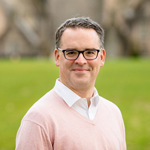
Thomas Weber is Professor of History and International Affairs and founding Director of the Centre of Global Security and Governance at the University of Aberdeen. He also is a Visiting Fellow of the Hoover Institution, Stanford University. Weber previously held fellowships or taught at Harvard, the Institute for Advanced Study in Princeton, the University of Pennsylvania, and the University of Chicago. His books include Becoming Hitler: The Making of Nazi (Basic Books) and most recently Als die Demokratie starb: Die Machtergreifung der Nationalsozialisten – Geschichte und Gegenwart (When Democracy Died: The Nazi Seizure of Power and Insights from the Past for Today) (Herder). His books are the recipients of four prizes, including the Duc d’Arenberg Prize for the best book on European History.






